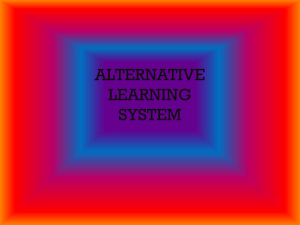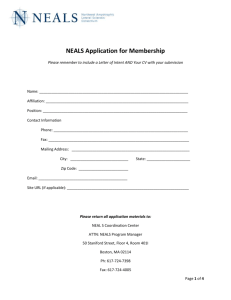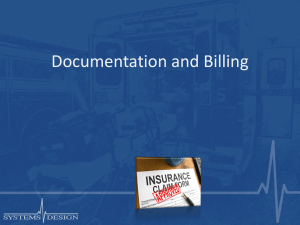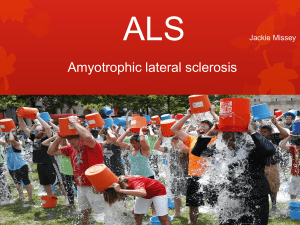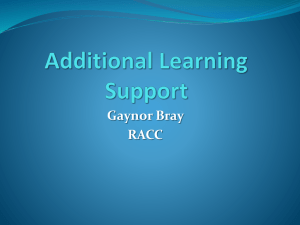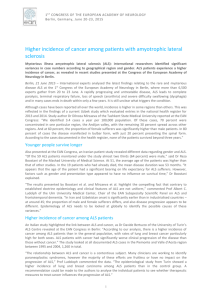Note, on the article, the ways the writer tries to affect the reader. Fill
advertisement
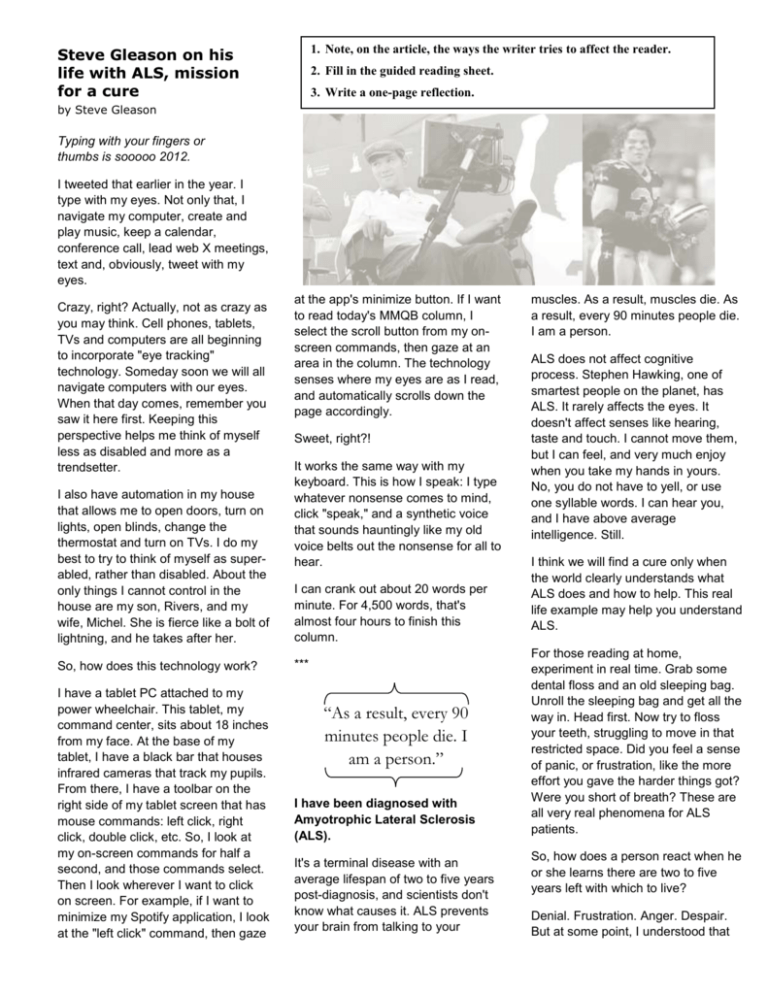
1. Note, on the article, the ways the writer tries to affect the reader. Steve Gleason on his life with ALS, mission for a cure 2. Fill in the guided reading sheet. 3. Write a one-page reflection. by Steve Gleason Typing with your fingers or thumbs is sooooo 2012. I tweeted that earlier in the year. I type with my eyes. Not only that, I navigate my computer, create and play music, keep a calendar, conference call, lead web X meetings, text and, obviously, tweet with my eyes. Crazy, right? Actually, not as crazy as you may think. Cell phones, tablets, TVs and computers are all beginning to incorporate "eye tracking" technology. Someday soon we will all navigate computers with our eyes. When that day comes, remember you saw it here first. Keeping this perspective helps me think of myself less as disabled and more as a trendsetter. I also have automation in my house that allows me to open doors, turn on lights, open blinds, change the thermostat and turn on TVs. I do my best to try to think of myself as superabled, rather than disabled. About the only things I cannot control in the house are my son, Rivers, and my wife, Michel. She is fierce like a bolt of lightning, and he takes after her. So, how does this technology work? I have a tablet PC attached to my power wheelchair. This tablet, my command center, sits about 18 inches from my face. At the base of my tablet, I have a black bar that houses infrared cameras that track my pupils. From there, I have a toolbar on the right side of my tablet screen that has mouse commands: left click, right click, double click, etc. So, I look at my on-screen commands for half a second, and those commands select. Then I look wherever I want to click on screen. For example, if I want to minimize my Spotify application, I look at the "left click" command, then gaze at the app's minimize button. If I want to read today's MMQB column, I select the scroll button from my onscreen commands, then gaze at an area in the column. The technology senses where my eyes are as I read, and automatically scrolls down the page accordingly. Sweet, right?! It works the same way with my keyboard. This is how I speak: I type whatever nonsense comes to mind, click "speak," and a synthetic voice that sounds hauntingly like my old voice belts out the nonsense for all to hear. I can crank out about 20 words per minute. For 4,500 words, that's almost four hours to finish this column. *** “As a result, every 90 minutes people die. I am a person.” I have been diagnosed with Amyotrophic Lateral Sclerosis (ALS). It's a terminal disease with an average lifespan of two to five years post-diagnosis, and scientists don't know what causes it. ALS prevents your brain from talking to your muscles. As a result, muscles die. As a result, every 90 minutes people die. I am a person. ALS does not affect cognitive process. Stephen Hawking, one of smartest people on the planet, has ALS. It rarely affects the eyes. It doesn't affect senses like hearing, taste and touch. I cannot move them, but I can feel, and very much enjoy when you take my hands in yours. No, you do not have to yell, or use one syllable words. I can hear you, and I have above average intelligence. Still. I think we will find a cure only when the world clearly understands what ALS does and how to help. This real life example may help you understand ALS. For those reading at home, experiment in real time. Grab some dental floss and an old sleeping bag. Unroll the sleeping bag and get all the way in. Head first. Now try to floss your teeth, struggling to move in that restricted space. Did you feel a sense of panic, or frustration, like the more effort you gave the harder things got? Were you short of breath? These are all very real phenomena for ALS patients. So, how does a person react when he or she learns there are two to five years left with which to live? Denial. Frustration. Anger. Despair. But at some point, I understood that acceptance of this diagnosis was not admitting defeat. That was critical for me personally. I think our lives are enriched when our own death is a conscious thought. I am not saying we should obsess over this, but it can be useful, because it makes you focus on the things and people you truly love. After that realization, I started to dig in, to look forward to what might be in my future. Because ALS research is underfunded and under-resourced, patients end up fading away quietly. I did not want to fade away quietly. Then I noticed something unique about a handful of ALS patients. They were living beyond the two-to-fiveyear estimate. A small fraction of ALS patients progress very slowly. These people went beyond that. They were choosing to go on ventilators, and continue with life. Years. Decades! I was shocked. These people were not fading quickly or quietly. I realized these patients had three crucial elements to help them: the right support, the right technology and purpose. They had things they were so passionate about, they were willing to go on a ventilator to continue to pursue them. A perfect example is O.J. Brigance, Director of Player Development for the Ravens. O.J., who has become a mentor to me, is not dying from ALS. He is choosing to live with ALS. After my diagnosis, I was determined to gather the right support, the right technology and continue living a purposeful life. For decades, despite the progression of the disease. Michel and I made some decisions. We were passionate about having a child. And so Rivers was born in October 2011. Ten months after my diagnosis. I was a few months from completing my MBA at Tulane University. I was passionate about the courses, and made some friends for life during my time there. I chose to finish. I love adventure travel. So, Michel and I bought a sports mobile (think of a camper van on steroids) we nicknamed the Ironhorse, and drove from New Orleans to Alaska and back. I thought I could help other people live with ALS, so we started a non-profit dedicated to that. I am well into the disease progression. I am unable to walk, talk or eat. In some ways, this stage of the process is less frustrating than previous stages. I often feel normal. I forget that it's weird to eat through a tube or be in a wheelchair. Still, I can't deny that it's a struggle. In the words of Peter King, "This blows." I sit somewhere on the razor's edge. I am so happy to hear my son say, I love you dadu. So happy I want to explode. But I also have fleeting, but agonizing moments of frustration as I watch my friends throw him giggling in the air. I just want so badly to hug him like I used to hug the people I love so much, to brush his hair or hold his hand. The film The Diving Bell and the Butterfly, based the book of the same name, has a line that enlightens and comforts me. The protagonist, who has lost all ability to move except one eye, discusses his role as a father. He notes, "Even a fraction of a father is still a father." So we focus on creative ways to help me interact on intimate levels with Rivers. He sits with me every morning when he wakes up and every night before bed. He takes "walks" with me in my wheelchair. We have a Spotify playlist, and a YouTube channel. I pre-recorded me reading books early in my diagnosis, so we watch me read to him. He is learning sign language, and we watch live music videos. He now gives me high fives and helps me shower. *** Football and ALS. Current research shows that NFL players are more likely to have certain brain diseases. Additional research shows there have been 27 players diagnosed with ALS in the past 60 years. But it's important to note that more than 27 ALS patients, none of whom have ever played football, will die in the next two days. For me, this disease is global. It affects any race, gender or walk of life. But if football did, somehow, cause my ALS, what does that mean for my life? As humans, we are able to conjure and attach meaning to almost any circumstance or development. When handed what feels like a terminal diagnosis, it's human nature to ask, Why did this happen to me?! or What does this mean?! The question What caused this? can usually be analyzed and measured precisely. (Scientists are still working on defining the cause of ALS, and I am not sure if football caused my ALS.) On the other hand, interpreting meaning is, in my opinion, quite ambiguous. We cannot measure, verify or confirm meaning. We, as humans, create and apply meaning. When something happens to us, we become the author of meaning. The best philosophy I have adopted is to apply a useful and productive meaning, rather than a negative or destructive meaning, regardless of the circumstances in my life. So, I have conjured my own meaning from my circumstance, if in fact football did cause my ALS. It means to me that I gave my life helping a city and a region in ruins find some hope in their struggle for rebirth. I will never regret that. Name: __________________________________ “Steve Gleason on his life with ALS…” Date: __________ Note to Student: It is always good to practice your pre-reading strategies before reading something new. Use this sheet to help you organize your thoughts about this week’s Article of the Week. Before Reading Step 1: Preview the reading. Look at the title(s), bold-faced words, pictures, headings, etc. Step 2: Make a prediction on what the reading is going to beStep 3: Activate your prior knowledge. Jot down some about. Write your prediction below. Be specific! things you might know about the topic and/or related topics. Write your ideas below. I predict the article is going to be about… Step 4: Know the author’s purpose for writing and your purpose for reading. Think about the ideas we discussed in class/look at your notes! The author’s purpose for writing this article was to… The writer wants the reader to… Word-A-Day: write the word and identify its part of speech and definition/synonym using only context clues (no Googling). 10/20:__________________________________________________________________________________________ 10/21: __________________________________________________________________________________________ 10/22: __________________________________________________________________________________________ 10/23: __________________________________________________________________________________________ During Reading (Think about what you are reading as you read!) What does the writer do to create a lighthearted mood in the beginning of the article?______________________________ __________________________________________________________________________________________________ __________________________________________________________________________________________________ What would Steve Gleason’s advice be to someone diagnosed with ALS?_______________________________________ __________________________________________________________________________________________________ __________________________________________________________________________________________________ After Reading (Critical Thinking Response) What do you think Steve Gleason’s overall attitude toward his condition is? Support your opinion with evidence from the article. __________________________________________________________________________________________________ __________________________________________________________________________________________________ __________________________________________________________________________________________________ __________________________________________________________________________________________________ __________________________________________________________________________________________________ __________________________________________________________________________________________________ __________________________________________________________________________________________________ __________________________________________________________________________________________________ __________________________________________________________________________________________________ __________________________________________________________________________________________________ __________________________________________________________________________________________________ __________________________________________________________________________________________________ __________________________________________________________________________________________________ __________________________________________________________________________________________________ __________________________________________________________________________________________________ __________________________________________________________________________________________________ __________________________________________________________________________________________________ __________________________________________________________________________________________________ __________________________________________________________________________________________________ __________________________________________________________________________________________________ __________________________________________________________________________________________________ __________________________________________________________________________________________________ __________________________________________________________________________________________________ __________________________________________________________________________________________________ __________________________________________________________________________________________________

